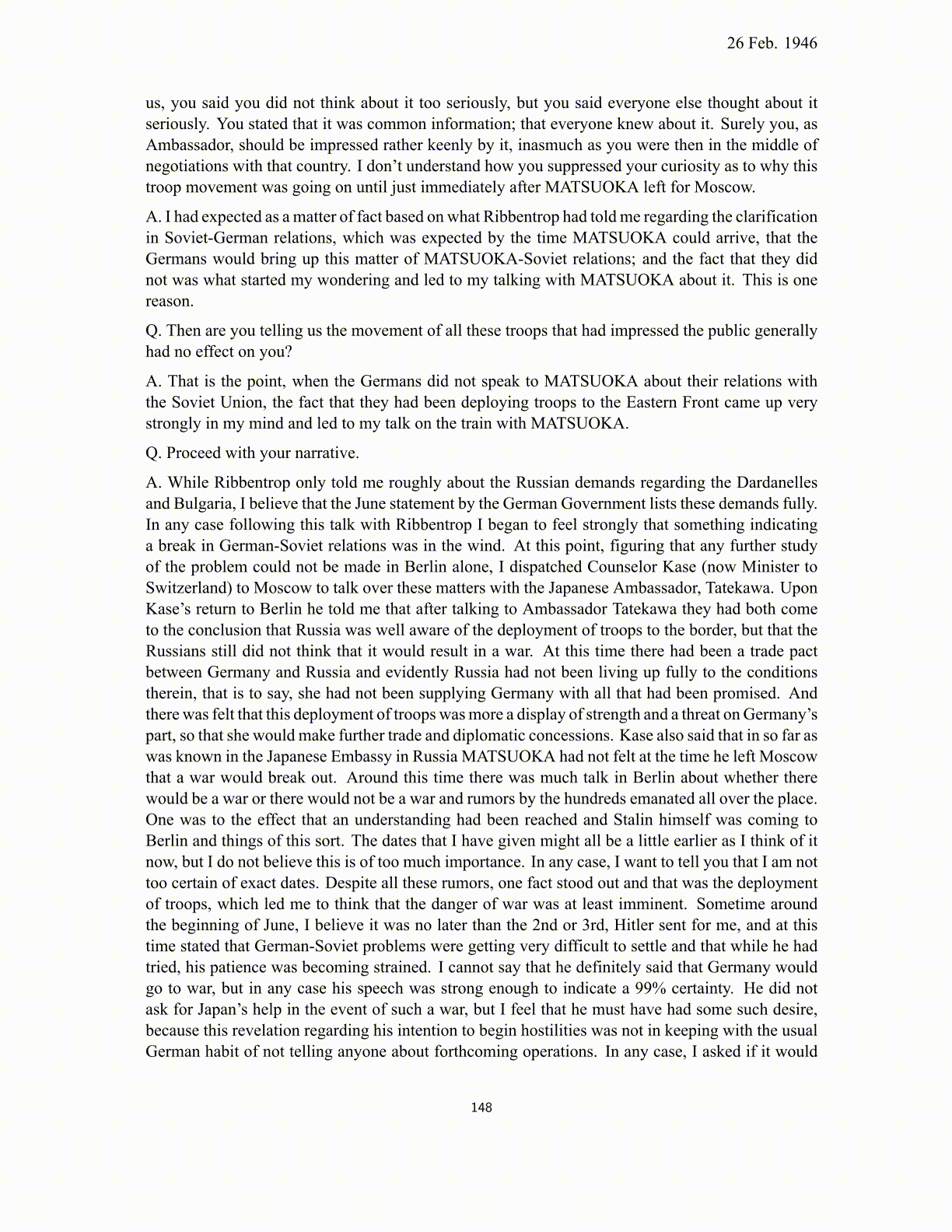
26 Feb. 1946 us, you said you did not think about it too seriously, but you said everyone else thought about it seriously. You stated that it was common information; that everyone knew about it. Surely you, as Ambassador, should be impressed rather keenly by it, inasmuch as you were then in the middle of negotiations with that country. I don’t understand how you suppressed your curiosity as to why this troop movement was going on until just immediately after MATSUOKA left for Moscow. A. I had expected as a matter of fact based on what Ribbentrop had told me regarding the clarification in Soviet-German relations, which was expected by the time MATSUOKA could arrive, that the Germans would bring up this matter of MATSUOKA-Soviet relations; and the fact that they did not was what started my wondering and led to my talking with MATSUOKA about it. This is one reason. Q. Then are you telling us the movement of all these troops that had impressed the public generally had no effect on you? A. That is the point, when the Germans did not speak to MATSUOKA about their relations with the Soviet Union, the fact that they had been deploying troops to the Eastern Front came up very strongly in my mind and led to my talk on the train with MATSUOKA. Q. Proceed with your narrative. A. While Ribbentrop only told me roughly about the Russian demands regarding the Dardanelles and Bulgaria, I believe that the June statement by the German Government lists these demands fully. In any case following this talk with Ribbentrop I began to feel strongly that something indicating a break in German-Soviet relations was in the wind. At this point, figuring that any further study of the problem could not be made in Berlin alone, I dispatched Counselor Kase (now Minister to Switzerland) to Moscow to talk over these matters with the Japanese Ambassador, Tatekawa. Upon Kase’s return to Berlin he told me that after talking to Ambassador Tatekawa they had both come to the conclusion that Russia was well aware of the deployment of troops to the border, but that the Russians still did not think that it would result in a war. At this time there had been a trade pact between Germany and Russia and evidently Russia had not been living up fully to the conditions therein, that is to say, she had not been supplying Germany with all that had been promised. And there was felt that this deployment of troops was more a display of strength and a threat on Germany’s part, so that she would make further trade and diplomatic concessions. Kase also said that in so far as was known in the Japanese Embassy in Russia MATSUOKA had not felt at the time he left Moscow that a war would break out. Around this time there was much talk in Berlin about whether there would be a war or there would not be a war and rumors by the hundreds emanated all over the place. One was to the effect that an understanding had been reached and Stalin himself was coming to Berlin and things of this sort. The dates that I have given might all be a little earlier as I think of it now, but I do not believe this is of too much importance. In any case, I want to tell you that I am not too certain of exact dates. Despite all these rumors, one fact stood out and that was the deployment of troops, which led me to think that the danger of war was at least imminent. Sometime around the beginning of June, I believe it was no later than the 2nd or 3rd, Hitler sent for me, and at this time stated that German-Soviet problems were getting very difficult to settle and that while he had tried, his patience was becoming strained. I cannot say that he definitely said that Germany would go to war, but in any case his speech was strong enough to indicate a 99% certainty. He did not ask for Japan’s help in the event of such a war, but I feel that he must have had some such desire, because this revelation regarding his intention to begin hostilities was not in keeping with the usual German habit of not telling anyone about forthcoming operations. In any case, I asked if it would 148